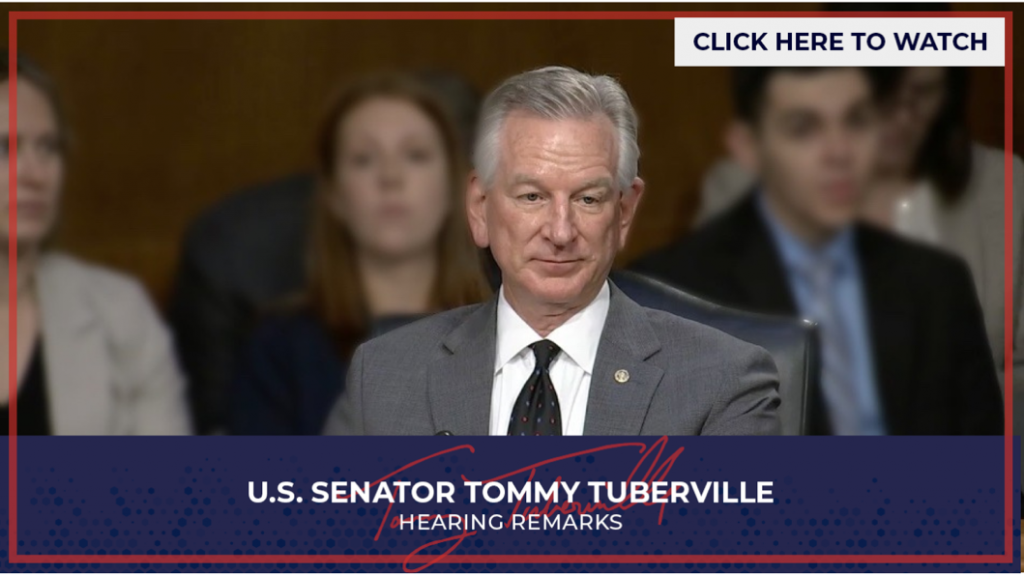WASHINGTON — U.S. Senator Tommy Tuberville (R-AL) is continuing to bring the concerns of Alabama’s agriculture industry to the table as the state’s voice on the U.S. Senate Agriculture, Nutrition, and Forestry (AG) Committee. During yesterday’s AG Subcommittee on Commodities, Risk Management, and Trade hearing, Senator Tuberville spoke about the need to prioritize crop insurance programs and remove capital barriers for producers, farmers, and producers. The hearing was one in a series of meetings leading up to drafting of the 2023 Farm Bill.
Senator Tuberville opened the hearing with the following statement:
“As we heard during Tuesday’s hearing, protecting the farm safety net is the top priority for commodity groups across the country. For this Farm Bill, crop insurance programs represent only 7% of the total $1.5 trillion package. We cannot have an effective and functional safety net without stabilized crop insurance coverage for our producers. It’s not going to happen. Also, we must ensure our producers have access to capital and risk management tools to weather rising input costs and skyrocketing prices for farmland and equipment.”

Excerpts from his remarks can be found below, and his complete remarks can be found here.
ON FSA GUARANTEE LOAN LIMITS
TUBERVILLE: “Mr. Wagner and Mr. Morgan, I hear from Alabama poultry producers about the rising costs of poultry houses. Four houses can cost up to $2.5 million dollars or more. In your testimony, you mention the need to increase FSA Guaranteed Loans. What is the appropriate level of FSA Guaranteed Loan limits?”
MORGAN: “Farm Credit is asking for an increase of $3.5 million for construction and up to $3 million for operating. In my statement, I indicated a similar example of what it takes for a poultry farmer to make $75,000. According to the U.S. Census Bureau, the household median income for the last two years has been about $70,000. So, for a poultry producer, they’ve got to make about a $3.3-million-investment in order to achieve the same level of median income. An increase in the guarantee amount, which is currently a little over $2 million dollars, would significantly cover the cost of those houses and be an entry point for so many beginning, young, and small farmers.”
WAGNER: “When you have a construction loan and an operating loan, and those two things combined, that limit still applies. I think where we may have young, beginning farmers who may have some help on the land loan may not have that same help on the operating loan, and so that limit is real and as the cost of inputs and the cost of land move up as Senator Ernst indicated, you run into those limits really fast. So, updating is important.”
ACRE’S IMPACT ON COMMUNITY BANKS
TUBERVILLE: “I was a cosponsor of ECORA last Congress and look forward to supporting ACRE this Congress. Mr. Barker, can you share with the Committee how ACRE could allow community banks like yours to better serve rural communities in your market?”
BARKER: “With a lower interest rate, with those interest income-tax free to the bank, we could pass that on to our borrowers. Any cost savings that we could provide those beginning farmers is essential. We can’t control the input costs or anything else. The only thing we can control is the interest and that is one way we could do that, by having that interest tax-free to the bank on the ag side of things. Also, in my markets, my towns are all under 2,500 people and the housing situation is very, very difficult there. And it would really benefit my folks who have very limited means of income in making a purchase and affording the houses, rather than the double and triple interest rates they see now.”
Senator Tommy Tuberville represents Alabama in the United States Senate and is a member of the Senate Armed Services, Agriculture, Veterans’ Affairs, and HELP Committees.
###